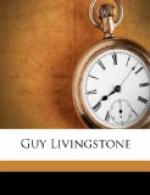As he answered deliberately, each slow word shut out another hope, like bolts shot, one by one, in the lock of a prison door.
“I remember nothing of the past except your last act, for which I will never, never forgive you. I form no wish for your welfare or for the reverse. There shall not stand the faintest shadow of a connecting link that I can break asunder. Between you and me there is the gulf of a fresh-made grave, and no thought of mine shall ever cross it—so help me God in Heaven!”
Flora’s last arrow was shivered: if she had had another in her quiver, she would have had no courage to try it after hearing those terrible words. She caught his hand, however, before he could guess her intention, and pressed her lips upon it till they left their print behind, and then she was gone. Her light foot hardly sounded as it sprang down the stairs, but its faint echo was the last living sound connected with Flora Bellasys that ever reached the ear of Guy Livingstone.
When I heard more of the interview, I thought, and think still, that he erred on the side of harshness. He was so fixed and steady in his purpose that he could have afforded to have compromised a little in expressing it. But he did things in his own way, and fought with his own weapons—effective, but hardly to be wielded by most men, like the axe of the King-maker or the bow of Odysseus. In carrying out his will, he was apt to consider the softer feelings of others as little as he did his own. It was just so with him when riding to hounds: he went as straight as a line, and if he did not spare his horses, he certainly did not himself.
To each man alive, one particular precept of the Christian code is harder to realize and practice than all the rest put together. It was this, perhaps, which drove the anchorites on from one degree of penance to another, and made them so savage in self-tormenting. When the macerated flesh had almost lost sensation, the thorn that had galled it sometimes in their hot youth rankled incessantly, more venomous than ever. That one injunction—“Forgive, as you would hope to be forgiven”—was ever a stumbling-block to Guy.
Besides all this, he knew, better than any one, what sort of an adversary he was contending against; one with whom each step in negotiation or temporizing was a step toward discomfiture. It was like the Spaniard with his navaja against the sabre: your only chance is keeping him steadily at the sword’s-point, without breaking ground; if he once gets under your guard, not all the saints in the calendar can save you.
Perhaps, then, he was right, after all. Certainly Ralph Mohun thought so, as he listened to a sketch of the proceedings with a grim satisfaction edifying to witness.
As for me, before I went to bed that night, I read through those chapters in the “Mort d’Arthur” that tell how the long, guilty loves of Launcelot and Guenever ended. In the present case, there was certainly wonderfully little penitence on the lady’s side, but yet there were points of resemblance which struck me. [I always think the queen must have been the image of Flora.] It is worth while wading through many chapters of exaggeration and obscurity to come out into the noble light of the epilogue at last.




